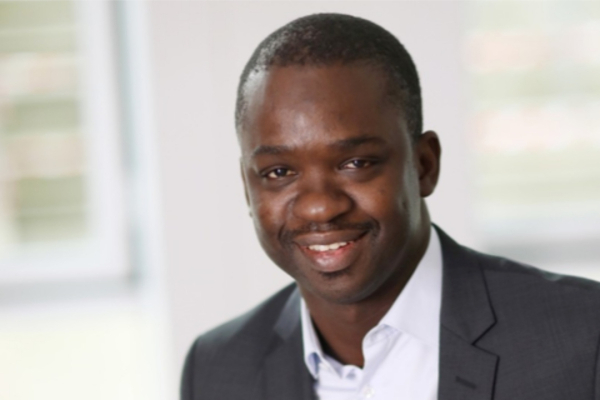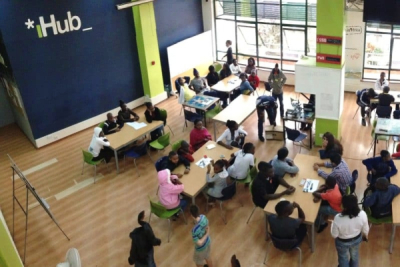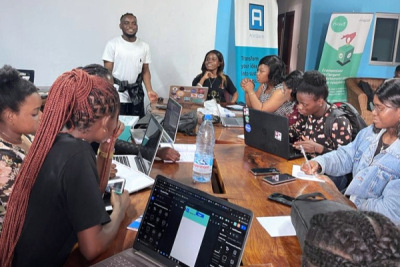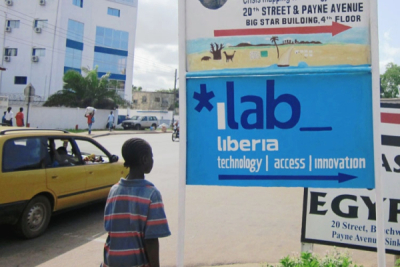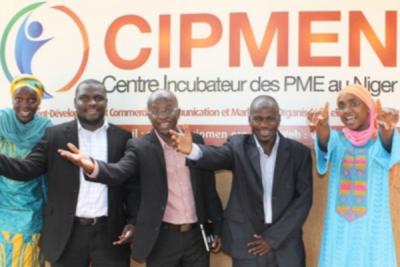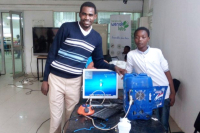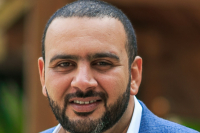
TECH STARS (1006)
He runs an edtech company that focuses on teaching children coding. He is also behind several technology solutions that are revolutionizing the education sector in Africa.
Matthew Henshall (photo) is a South African serial entrepreneur who graduated from the University of Cape Town with a bachelor's in electromechanical engineering. He is the founder and CEO of educational technology startup Code4Kids, founded in 2018.
His startup enables teachers to teach children aged between 8 and 15 coding, robotics, and computer science using real-world tools and content. It also provides continuous training to keep teachers always abreast with new technologies. The startup was recently selected to participate in the Mastercard Foundation EdTech Fellowship program. The program, initiated in partnership with edtech accelerators and innovation centers, aims to support fast-growing and impactful edtech companies.
Matthew Henshall is also the founder and CEO of Lessonspace, a Twilio-like collaborative space launched in 2018. It allows teachers to deliver live, online lessons individually or in groups.
He also founded romm.sh, the video-conferencing software that powers Lessonspace, and Code4Kids. In 2016, he launched SkillUp Tutors, an online platform that connects students and tutors.
The serial entrepreneur started his professional career, in 2014, as a systems engineer for the nutritional company Vital Health Foods. Between 2015 and 2016, he worked for energy supplier BattCo Energy Storage Systems as an electromechanical engineer.
Melchior Koba
He is a remarkable entrepreneur who has contributed significantly to the development of technology in Africa. His vision and leadership have enabled his fintech startup, InTouch SA, to become one of the leaders in the African mobile payment industry.
Omar Cissé (photo), the founder and CEO of fintech startup InTouch SA, is a Senegalese entrepreneur renowned in the African fintech ecosystem. A graduate of the Polytechnic Institute of Dakar where he earned a degree in computer science and design engineering, he also holds a master’s in business administration from the Higher Institute of Management (still in Senegal).
In 2014, he founded InTouch SA, a financial technology company that provides a mobile payment platform for financial transactions in Africa. The company provides innovative technology that allows it to manage all of its customers' transactional needs in a secure, efficient, and simple manner.
His financial technology company enables its customers to collect and settle payments in real-time across the continent through an application that offers features such as payment acceptance, customer retention, airtime top-up, billing and dunning, expense management, deferred payment, money transfer, and intercontinental settlement.
InTouch SA has become one of the leaders in the mobile payment industry in Africa with partners such as Total, Orange Money Senegal, and IFAD (International Fund for Agriculture Development). To date, it has a network of 2,000 corporate customers and 50,000 TouchPoints (distribution points) in 14 countries. Far from sitting on its laurels, it is taking action to reinforce that network. The company has also built and regularly updates a catalog of over 400 digital services. It plans to establish its subsidiaries in 25 African countries and have a network of partners in every country on the continent by 2025.
Its founder and CEO, Omar Cissé, is also the administrator and co-promoter of Teranga Capital, a Dakar-based investment firm that invests in SMEs. In 2001, he co-founded 2SI, an IT engineering services provider. He managed the company from 2005 to 2010 before launching CTIC Dakar, Dakar’s first incubator.
Melchior Koba
iHub provides a collaborative workspace, training programs, events, and networking opportunities to entrepreneurs. With its vibrant community and start-up support programs, it plays a key role in the development of technology innovation in Africa.
iHub is a technology innovation center based in Nairobi, Kenya. Founded in 2010 by Ushahidi founders Erik Hersman, Juliana Rotich, and David Kobia, it is a co-working space, startup community, and innovation platform that brings together entrepreneurs, software developers, innovators, and investors interested in developing tech solutions to address key issues in Africa.
With a global network spanning over 40 countries, it is one of the largest technology innovation communities in Africa. The center offers a collaborative work environment, training programs, events, and networking opportunities to its community members. Through its programs, start-ups can benefit from financial support, mentoring, and access to industry experts.
In February 2023, the Innovation Center partnered with the Mastercard Foundation to support education startups. The partnership led to the establishment of a three-year acceleration program targeting 36 edtech startups, of which 12 have already been selected for the first cohort.
The programs and events it organized include the Women in Business program that promotes women's entrepreneurship in the information and communication technology (ICT) sector in Kenya by helping targetted individuals create sustainable businesses. The program also provides training, coaching, funding, and networking opportunities to help beneficiaries overcome entrepreneurial barriers and strengthen their role in Africa's technology innovation.
In addition to Women in Business, iHub also implemented the Maarifa Kona Innovation Labs program from 2017 to 2019. This program supported agritech entrepreneurs from six African countries (Kenya, Uganda, Madagascar, Tanzania, Ethiopia, and Rwanda) in developing their innovative ideas and boosting their entrepreneurial capacities in agriculture.
iHub has a remarkable impact on the African innovation ecosystem and has inspired more than 450 start-ups over the years. It has several international partners such as Facebook, Google, Oracle, Safaricom, the World Bank, and Seacom.
Melchior Koba
With its training programs, workspace, and communities, ActivSpaces helps African innovators launch and grow their promising businesses.
ActivSpaces -African Center for Technology Innovation and Ventures- is an open collaboration space, technology innovation center, and startup incubator for entrepreneurs and innovators in Africa.
The Douala-based center was founded, in 2010, by Rebecca Enonchong, Valery Colong, Bill Zimmerman, and Tse Fua. Apart from that base, it also has offices in Buea and Bangangté.
It acts as a unique community that seeks to foster the growth of innovative tech startups in Cameroon. To achieve its goals, it initiated an incubation program that offers office space, Internet connection, personalized coaching, and expert support to entrepreneurs.
Its workspaces allow members access to a variety of equipment such as 3D printing, laser engraving, Arduino and Raspberry Pi systems, solar kits, etc. to bring their projects to fruition. By joining ActivSpaces' incubation program, startups benefit from the community's expertise and personalized coaching that helps them overcome the obstacles they may face while starting and growing their businesses.
The center is open to everyone. “We don’t want to be just for the elite and those that will succeed. Rather than [having] the best of the best coming to us, we wanted to reach out to the people who don’t even know they’re entrepreneurs,” said Rebecca Enonchong.
In 10 years of operation, the incubator has implemented more than 25 projects, supported more than 150 entrepreneurs, and created 10 communities. As a non-profit organization, it is supported by partners committed to entrepreneurship and innovation in Africa. These include AfriLabs, Afric'Innov, CIPMEN, Investment Partners, GIZ, Cusco International, Venture Capital for Africa, Orange, and Business France.
Melchior Koba
iLab Liberia promotes technology and innovation in West Africa. It helps build the technical capabilities of the Liberian youth and promotes ICT for the country’s development.
iLab Liberia is a tech training center and collaborative workspace based in Monrovia, the capital of Liberia. Founded in 2011 by digital champion Kate Cummings, iLab Liberia aims to build the technical capacity of Liberians and promote the use of information and communication technologies (ICTs) for social and economic development in the country.
Since its inception, the center has offered over 300 training courses and events to more than 3,500 students in areas such as web and mobile development, open data and visualization, data collection and analysis, geospatial and participatory mapping, physical computing and networking, coding, and other skills focused on open source technologies and relevant solutions.
It also offers entrepreneurship programs to help young Liberians start their technology businesses, as well as shared workspaces for technology professionals and innovators. In addition, it provides technology customization services for projects across West Africa, including mobile platforms for data collection and analysis, online reporting platforms for citizen engagement and good governance initiatives, geospatial mapping, and web and mobile solutions.
The center has overseen the customization and implementation of surveys with more than 30,000 respondents in urban and rural settings. It trained dozens of enumerators and helped data analysts working for governments and nonprofit organizations make the best use of the results.
For its previous activities, iLab Liberia worked closely with institutions such as USAID, World Bank, GIZ, Humanity United, Natembea, mySociety, and National Democratic Institute, among others.
In collaboration with Accountability Lab Liberia, it co-manages iCampus Liberia, a shared innovation, co-working, and community space dedicated to tech entrepreneurs and organizations. The campus it manages is both a physical and virtual space providing ICT and entrepreneurship training to the youth as well as a hub for networking and innovation. It also serves as a focal point for working with women, minorities, and digital changemakers, encouraging inclusion and promoting equitable access to digital opportunities.
Melchior Koba
By providing workspaces, training, mentoring, and funding opportunities, CIPMEN has enabled many startups to turn their innovative ideas into successful businesses.
CIPMEN, Niger’s SMEs Incubator Center, is an ambitious and innovative business incubator that aims to stimulate innovation and entrepreneurship in Niger. The incubator, founded in 2014, has become one of the key players in the African startup ecosystem.
Led by Maman Rouffahi Koabo, an experienced IT consultant and agritech entrepreneur, it offers an extensive range of services to entrepreneurs, including workspaces, training, and mentoring. It also connects them to investors, partners, and potential customers. Startups selected to participate in its incubation program can receive personalized support to grow their businesses.
The incubator organizes events such as Café Numérique -an event initiated to discuss issues faced by local fintech startups, Hack the Goals Niger -the Niger chapter of hackathons launched by Belgian development agency Enabel to help identify innovative solutions for the achievement of sustainable development goals, and eTakara.ne -a national digital competition that aims to identify and support digital talent.
It recently issued a call for applications for a program aimed at supporting innovative projects in renewable energy, agribusiness, environment, and information and communication technologies. It also implemented several projects like CODELOCCOL, a coding academy, and CIPMEN EXPORT, a project aimed at funding agribusiness and manufacturing businesses with high export potential and good financial health.
It carries out its activities in partnership with institutions, governments, and organizations. Its partners include the Nigerien government, the World Bank, the French Development Agency (AFD), TOTAL, and GAMA Informatique.
CIPMEN has incubated 222 companies, trained over 7,901 people, and organized over 30 events. Companies such as AgriPart, Tout Azimut, City Links, and Niger Digital have all benefited from its expertise and resources to develop their businesses.
Melchior Koba
Jokkolabs is a model in the African entrepreneurial ecosystem. Through its programs, events, and partnerships, it actively contributes to creating a dynamic and sustainable entrepreneurial ecosystem on the continent.
Jokkolabs is a tech innovation and co-working network for entrepreneurs and startups. The network, created in 2010, has become a major player in the African entrepreneurial ecosystem. It was founded by Karim Sy, a Senegalese entrepreneur, to stimulate innovation and contribute to growth on the continent.
The first Jokkolabs was opened in Dakar, Senegal in 2010, and since then the network has grown rapidly. Presently, it has several centers in West Africa, Central Africa, and even France. The network offers shared workspaces, training, events, and mentoring services for startup entrepreneurs in Africa and the African diaspora.
The Jokkolabs model is based on collaboration and knowledge exchange. Its centers are designed to encourage interaction and cooperation between entrepreneurs, which fosters the creation of a dynamic and innovative ecosystem. Members have access to high-quality resources and services, as well as a valuable network of contacts that can help them grow their businesses.
The network organizes regular events, talks, and a wide range of activities. These include Jokkokids launched -in 2016 in collaboration with Help the Street Children- to stimulate creativity and collaboration among children aged 6-12 and Jokkofood which is a national food innovation competition geared towards young entrepreneurs.
In collaboration with Make Sense, Jokkolabs also launched Jokko Sense, a business breakfast for entrepreneurs with socially and environmentally impactful initiatives. It represents, coordinates, and federates the Global Entrepreneurship Week in five countries and organizes coding training sessions for teachers as part of the Africa Code Week so that they can train young people aged 8-18.
For its activities, Jokkolabs partners with several key players in the African entrepreneurial ecosystem. Its partners include Google, tuition-free coding academy Simplon, and French banking group Société Générale. These partnerships allow Jokkolabs to strengthen its impact and continue to offer high-quality programs and events to entrepreneurs.
WenakLabs is a key player in Chad's entrepreneurial ecosystem. By helping innovative technology start-ups succeed, it contributes to the economic and social development of the country while stimulating innovation and creativity.
In the budding Chadian entrepreneurial ecosystem, tech hub WenakLabs is at the vanguard of innovation and creativity. The N’Djamena-based hub offers incubation, mentorship, and financing opportunities to innovative startups and helps individuals and businesses transform their ideas into flourishing companies.
It was born, in 2014, from the collaboration of Chadian bloggers, the French platform Mondoblog, the local network JerryClan Tchad and tech entrepreneur Abdelsalam Safi- who is currently the CEO of WenakLabs. Since then, it has worked closely with local and international partners such as AfriLabs, Oxfam, the French Institute, Moov Africa, Sahel Innov, and UNICEF to provide resources and tools to help Chadian entrepreneurs launch and grow their businesses.
To encourage youth entrepreneurship, WenakLabs provides innovators with a fab lab and a media lab. The fab lab is an open-access digital production space, where digitally controlled machines are made available to the general public for the design and creation of physical objects following an open-space collaborative work model. This place is open to young people who want to acquire skills to quickly transform their ideas into physical prototypes.
The media lab provides an environment for incubatees and project leaders to communicate innovatively and effectively by using new technologies to process, visualize and share information. It also provides a means to disseminate reliable and engaging information to inspire communities to action.
The tech hub claims some 120 startups incubated and 70 projects developed in Chad. Its achievements include ZereSoft, a platform that aims to modernize agriculture and the rural world with 2.0 tools, DaTchad, a data journalism agency project, and Nomad Learning, an SMS-based learning platform.
The incubator regularly organizes programs and events such as the Startup Weekend N'Djamena and DENE MAGIC, a program held in 2022 that aims to provide digital skills to women to bring them closer to decent jobs. WenakLabs also advises, trains, and coaches socioeconomic and digital development actors in the country.
It strives to foster diversity and inclusion in the Chadian entrepreneurial ecosystem. It also promotes equal opportunities for all entrepreneurs, whether they are men or women, novices or experienced, regardless of their social background.
Melchior Koba
It is a fast-growing center that offers an environment conducive to innovation, education, and technology. With its modern infrastructure and advanced technologies, Sèmè City is an attractive destination for entrepreneurs, investors, and students.
Sèmè City, located in Benin, is a smart city that aims to become a regional center of excellence in higher education, research, innovation, and economic development.
It was launched, in 2017, by the Beninese government and is being implemented by the Sèmè City Development Agency (ADSC), headed by Claude Borna, an experienced tech and marketing professional. The city is equipped with modern infrastructure, including research laboratories, innovation centers, coworking spaces, conference rooms, housing for students and researchers, and sports and cultural facilities.
Its proposed campus is still under construction but, the city currently operates from four sites. The first site, Sèmè One, is a modern and intelligent campus that includes classrooms, coworking spaces, a language center, offices, and a data center.
The second site, Sèmè Two, is an innovation park designed to promote new research and innovation approaches accessible to every individual above 8 years old. It includes a tool park for digital design and manufacturing and 3D printing, as well as a laboratory to teach X-ray techniques.
The third site, Sèmè Three, created in partnership with UNICEF Benin and UNFPA Benin, is a community center that welcomes young people between the ages of 8 and 18 with workshops and training around themes such as environmental protection, recycling, entrepreneurship, and audiovisual professions.
The last one, called Sèmè Four or Pi, is a building that hosts the reference computer science school Epitech Benin.
Sèmè City regularly hosts events such as the Webinar on "Integrating Open Data and Artificial Intelligence in the Development of Smart Cities in Africa," the Continuing AI Professional Development, and the Summer School organized in partnership with Sorbonne University on the theme "Materials, Innovation, and Sustainable Development" in 2022.
Thanks to the city, the Beninese government plans to create more than 100,000 jobs -half of which will be self-employment and 40% targeting women- by 2032 to become the key partner of innovative projects in strategic areas and to contribute to the achievement of the Sustainable Development Goals (SDGs). The goals are expected to be achieved in collaboration with partners like the World Bank, Isocel, Irex, The Tony Elumelu Foundation, Smart Africa, and UNDP, among others.
Melchior Koba
He is a former Deputy Minister of Investment and International Cooperation in Egypt. He is the brain behind several accelerators. He now runs an investment firm and financial services platform that supports fintech startups.
Shehab Marzban (photo) is an Egyptian entrepreneur and investor. He is the co-founder and managing partner of Camel Ventures, the first venture debt and fintech-focused investment firm in Egypt.
The investment firm, founded in 2020, partners with exceptional co-founders to help them build sustainable and high-growth businesses with regional and even global reach. It recently launched a $16 million fund focused on the Egyptian fintech startup ecosystem. The fund is regulated by the Egyptian Financial Regulatory Authority and offers equity investments for early-stage startups and local currency venture loans for later-stage startups.
“The success of the startup relies on the collective strength of all partners and stakeholders. We focus on our deep local knowledge, regulatory and business expertise, as well as our global outreach and network to support local champions while strengthening their growth on a regional and global level,” Camel Ventures said when announcing the VC fund.
Its managing partner, Shehab Marzban, graduated from Cairo University with a Master's in Operations Research and Decision Support in 2004. He received his Ph.D. in Information Systems and Operations Research from the University of Cologne in 2008 and did postdoctoral research in Islamic Economics and Finance at Durham University between 2009 and 2012. In 2015, he completed an executive program in venture capital at the Haas School of Business at the University of California, Berkeley.
In 2021, he founded Digital Finance Holding (DFin), a financial services platform that supports and promotes financial technology (fintech) companies in the non-bank financial services sector.
In 2012, he founded the crowdfunding company Shekra to support the education, legality, funding, mentoring, and monitoring processes of startups. In 2017, he also founded the entrepreneurship center Fekretak Sherketak, the investment company Egypt Ventures, and the accelerator EFG EV Fintech that focuses on fintech startups.
Formerly an external consultant on venture capital, micro, small and medium enterprises, and Islamic finance at the World Bank Group (2013-2015), he worked at Egypt's Ministry of Investment and International Cooperation for 4 years. First appointed as a senior economic advisor to the minister in 2015, he later held the positions of deputy minister and chief advisor to the minister there.
Melchior Koba
More...
He is a biomedical engineer concerned with the protection of the environment in Africa and the world. He contributes his expertise to the cause through Kubik, a startup that transforms plastic waste into building materials.
Kidus Asfaw (photo) is an Ethiopian entrepreneur who graduated from Duke University with a bachelor's degree in biomedical and electrical engineering (in 2008). He is also a 2014 graduate of Princeton University with a master's in public affairs, development economics, and international affairs.
In 2021, he co-founded Kubik, an environmental startup which he serves as the CEO. His startup, founded in Kenya, gives a second life to hard-to-recycle plastic waste by turning them into low-cost and low-carbon building materials. Its ambition is to promote dignity through the construction of clean and affordable buildings for everyone and for every purpose -the materials can be used to build schools, clinics warehouses, and homes. On March 29, 2023, it was one of the two winners at the grand finale of the Global Startups Awards, considered one of the world’s biggest startup awards. Selected out of 120 tech companies from 115 countries, Kubik will thus have the opportunity to gain global recognition, explore new markets, access funding, and capitalize on an international network of leaders for its development.
Kubik is also one of the finalists of the 2023 Yale Africa Startup Review, a student- and alumni-led initiative that showcases founders and startups that are shaping Africa's future through entrepreneurship.
Before founding Kubik, Kidus Asfaw worked for UNICEF for over seven years. He joined the organization in 2014 as the product manager of the Global Innovation Centre in Uganda. Between 2017 and 2021, he was also UNICEF Uganda’s head of technology and innovation partnerships.
The entrepreneur has also worked in several other companies or institutions such as Accenture, where he was a technology manager between 2010 and 2012, and the World Bank where he was an innovation consultant from 2013 to 2014.
Melchior Koba
He gained visibility with the trade and investment promotion events he organized around the world. He then founded an international trade platform to enable local producers and traders to expand their export reach to the rest of the world.
Vital Sounouvou (photo) is a Beninese entrepreneur and trade and investment advisor. He holds a bachelor's in telecommunications and software engineering from the IUT in Calais, France, and a business management certificate from the University of Texas at Austin. He is renowned as the founder and CEO of Exportunity Group, an event management and trade promotion group.
Founded in 2012, Exportunity Group built its reputation as an event management and trade promotion company in West Africa, the United Arab Emirates, the United States of America, South Africa, and many others. The trade promotion activity played a crucial role in building the company's reputation and expanding its professional network.
In 2015, together with his team, Vital Sounouvou launched Exportunity.net with the goal of helping small African businesses expand their customer base and benefit from a secure payment system. The e-commerce platform was available to customers through a network of more than 700 outlets in West Africa until its closure in 2019.
In 2016, the entrepreneur explained that Exportunity came from the realization that despite the fairs he used to organize, he was still not connecting local producers with “big buyers.” “I organized fairs but I still did not solve the problems of these producers. In fact, in most sub-Saharan African countries there is no bridge between big buyers, people who can pay 100 containers of rice per month, and local producers. To observe this gap launched me in this adventure that is today Exportunity and still drives me every day,” he said.
Building on that drive, even when Exportunity was to be shut down, he launched another platform RayOn that has already been tested by over 800 firms across Africa. With its user-friendly interface, the new platform offers SMEs online shops to promote their businesses and a mobile app to manage sales and deliveries in real-time. RayOn also offers training for selected SMEs operating on its platform and funds their marketing campaigns.
In 2017, through Exportunity, he introduced the "XportCARD" Visa card in Benin, in collaboration with the United Bank for Africa. The cards were designed to help small and medium-sized businesses seeking an international payment solution securely conduct financial transactions globally. As of January 2022, XportCARDs was claiming over 6,300 active users and more than $80 million in transactions processed.
A 2014 Mandela Washington and 2015 Tony Elumelu Entrepreneurship Fellow, Vital Sounouvou is a 2016 Forbes Africa 30 under 30 list honoree.
Melchior Koba
He is a full-stack developer and an artificial intelligence and robotics researcher. With Guzo Technologies, he develops the Internet of Things (IoT), virtual reality, and prototyping solutions.
Daniel Getachew (photo) is the founder and CEO of Guzo Technologies. He graduated from Madaa Walabu University with a bachelor's in computer science in 2014 and from Adama Science and Technology University with a master's in software engineering. He also holds a Ph.D. in Artificial Intelligence and Robotics from the Addis Ababa Science and Technology University.
His company, Guzo Technologies, born in 2019, is a computer and media services startup based in Ethiopia. It focuses on virtual and augmented reality and the Internet of Things (IoT) solutions. It uses world-class game engines and develops CGI-based virtual tours with fun content. Apart from designing, developing, and prototyping IoT products, it also develops enterprise software.
On March 30, 2023, the company was selected as one of the six winning startups in the NINIJA accelerator program, which aims to support outstanding startups that address social issues in Ethiopia. As part of the program, it will undergo a proof of concept test with the Japan International Cooperation Agency (JICA) and receive four months of business development training.
The product that brought Guzo Technologies to the limelight is Guzo Maps, a virtual application that gives users the ability to interactively explore historical sites and places of interest in Ethiopia.
The man behind these achievements, Daniel Getachew, is also known as a member of Epic Games’ Unreal Engine developer community. He is also a contributor and Basic4X community member at mobile platform development tools publisher Anywhere Software.
Between 2015 and 2017, he worked as a computer vision and robotics researcher at Adama Science and Technology University. At the same time, he was the director of the TV series Hellotech on JTV Ethiopia. He held various technical positions at Gebeya, a recruitment technology start-up, between 2017 and 2020.
Between 2020 and 2021, he was the technical director of Globetrotter VR, a virtual reality company. Then, in 2022, he was hired again by Gebeya as a cybersecurity awareness trainer.
Melchior Koba
Concerned about climate change, which threatens Africa and the world, she founded BleagLee to convert waste into useful products. She has received several awards and recognitions.
Juvenile Ngum Ngwa (photo) is a Cameroonian entrepreneur who graduated from the University of Bamenda with a postgraduate diploma in marketing in 2015. She also holds an advanced diploma in environmental management from the Vancouver-based learning center BCcampus.
Currently, she is known as the co-founder and CEO of BleagLee, a cleantech company founded in 2019. Her startup aims to combat climate change by developing sustainable projects that turn large amounts of waste into useful products around the world. Its primary focus is to add economic value to waste while reducing the risks associated with its mismanagement and poor disposal practices. To achieve this mission, the company has developed software that quickly and automatically detects waste in various locations such as streets, fields, drainage channels, and green spaces. BleagLee's system is cost-effective, as it significantly reduces the logistical costs associated with the hours of driving required for data collection.
In 2019, through BleagLee, Juvenile Ngum Ngwa developed a project to produce sustainable baking ovens from recycled metals. The project won her the first prize in the "economic development" category at the third YouthConnekt Africa summit in Kigali.
She has been in the waste recycling industry for her whole career (professional and entrepreneurial). Indeed, she started her professional career, in 2016, by joining Naccig Cameroon as a waste resource operative. She held the position till 2018. In 2022, she was also the business development manager for the same company.
With BleagLee, she has received several awards and won several other competitions, including the YouthAdapt Solutions Challenge and the AFD Digital Challenge Awards in 2021.
Melchior Koba



